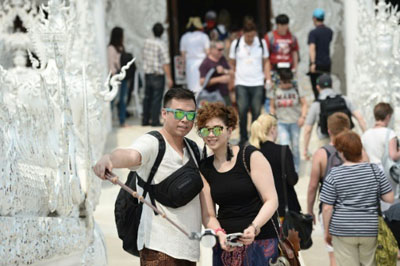Junta bullish on tourism resilience
Thailand’s junta said Tuesday the crucial tourist industry has been unaffected by last week’s deadly bomb attack, as police quizzed a taxi driver believed to have picked up the main suspect.
The bombing at Bangkok’s Erawan shrine killed 20 people including 14 foreigners and was Thailand’s worst single mass-casualty attack.
But eight days on, the trail appears to have gone cold, with police so far failing to track down a prime suspect captured on security cameras leaving a bag moments before the blast.
The majority of those killed were ethnic Chinese worshippers from across Asia, who flocked to the Hindu shrine in the belief that prayers there bring good fortune.
The 17 August attack, the first of its kind to kill large numbers of visitors to Thailand, has damaged its reputation as a welcoming and safe travel destination.
There have been no previous incidents of a tourist being killed during decades of political unrest, other than visiting journalists covering violent political clashes.
But the military government has been at pains to play down any suggestion visitors might be put off from visiting.
“The number of tourists in prominent tourist attractions both in Bangkok and other provinces is still high,” Colonel Winthai Suvaree, a spokesman for the junta, said Tuesday in a daily broadcast, without giving any numbers. He was quoting a Tourism Authority of Thailand situational report issued on Monday.
“The Ministry of Tourism and Sports has further reported that the statistics of foreign tourists travelling into Thailand is at a normal level,” he added.
Authorities have yet to make an arrest or say which group was behind the blast.
Police believe the main suspect, a young man with shaggy hair and a yellow T-shirt who may have been in disguise, was part of a network and was likely foreign.
On Tuesday a taxi driver added weight to that theory when he described picking up the man he believes to be the suspect and taking him to Hua Lamphong, the city’s main train station, a few hours before the blast.
“He only said the word Hua Lamphong and it sounded like a foreigner speaking Thai,” the taxi driver, who declined to give his name, told reporters after being questioned by police.
A motorbike taxi driver who took the suspect away from the site of the blast has previously said he was convinced the man did not speak Thai.
Investigators say they are working round the clock to identify the man.
But on Monday the national police chief said his team was being hampered by broken CCTV cameras — with only one in four working in some sections of the city.
City authorities hit back Tuesday, with an official saying only four of the 107 security cameras in the area where the attack took place were not operational.
“There was no mass breakage or inefficiency as reported,” Major-General Wichai Sungprapai, adviser to Bangkok’s governor, told reporters.
Police are known to have used both public and private security cameras to track the suspect.
Investigators have said the attack was clearly aimed at damaging the tourism industry but insist that Chinese tourists — who visit Thailand in larger numbers than any other nationality — were not singled out.
“We are sure the target is not only Chinese,” national police spokesman Prawut Thavornsiri told reporters late Monday without elaborating.
Nonetheless, tour operators and hotels that cater to the Chinese have told AFP that some were cancelling trips.
However analysts say it is too soon to know whether tourism has taken a hit.
Tourism accounts for about 10% of Thailand’s economy and had until recently been one of its few bright spots amid flagging exports and low consumer confidence.
The incident occurred during what is traditionally a low season month. Travel picks up from long-haul markets such as North America and Europe in October.
However, the recent surge in travel from China and neighbouring countries has bolstered travel during the low travel months of August and September.
Last year, the country suffered a considerable dip in travel during September and August due to the aftermath of the military coup.





